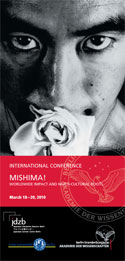
Currently Mishima Yukio remains the world’s best-known Japanese literary author. With 289 book translations, according to the authoritative UNESCO Index Translationum, he lies far ahead of Kawabata and Murakami. For decades, his literature has shaped Japan’s image in the world.
In its first part, “Woldwide Impact”, the Conference aims at communicating repercussions of Mishima’s art and existence on the international cultural scene to a wider audience.
The second part of the conference, “Multi-cultural Roots,” will be a more academic undertaking, in which scholars from all over the world discuss aspects of Mishima’s sources of inspiration and intercultural elements of his art.
After Mishima Yukio’s spectacular seppuku suicide in 1970, which made him notorious in the remotest corners of the globe, attention in Japan and abroad subsided briefly, even though throughout the 1970s and 1980s, many translations of his works were published. What makes his impact unique, however, is the extent to which he has since influenced many artists and intellectuals all over the world. Mishima has inspired films, dramas, ballets, operas, essays, performances, and other works of art by well-known figures and cultural icons such as Paul Schrader, Maurice Béjart, Bob Wilson, Marguerite Yourcenar, Hans Werner Henze, Ingmar Bergman, Murakami Takashi, Mayuzumi Toshirō, Benoît Jacquot and Yokoo Tadanori, to mention only some of the names that come to mind in this context.
Perhaps his international impact is also due to the multicultural roots of his own creativity. Mishima himself has stressed his commitment to a multitude of literary and cultural traditions and canons, from classical Greece to Fin de siècle symbolism, from Buddhism and theatrical genres of premodern Japan through twentieth century French or German literature, or from Yamamoto Jōchō, the Japan Romantic School through Nietzsche and Russian authors of the 1960s.
In Japan as well as on a global scale, the time seems ripe to reassess Mishima’s relevance, his fascination as well as the problematic involved. In Japan, we observe a renewed interest in Mishima, as a new generation turns to his work. Mishima, who crisscrossed every genre from theatre to novels, cinema, photographical and other self-performances, as well as bodybuilding, moved freely between high culture and subculture. Is Mishima, who was long traded as a political reactionary, turning into a model of Japanese “cool”, as was recently suggested? Why have artists of the most different kinds of orientation turned to him for inspiration? What are the sources of his own creativity? And what is Mishima’s relevance for today’s world? These are questions which the conference intends to address.
HOSTS:
- Berlin-Brandenburg Academy of Sciences and Humanities
- Freie Universität Berlin
- Japanese-German Center Berlin
Supported by:
- The Japan Foundation
- Lufthansa
- Embassy of Japan
- Shincho Foundation
- Friedrich Schlegel Graduate School of Literary Studies
Weiterführende Informationen:
Freie Universität Berlin, Japanologie
Japanisch-Deutsches Zentrum Berlin
Friedrich Schlegel Graduate School of Literary Studies
Embassy of Japan
Lufthansa
The Japan Foundation

